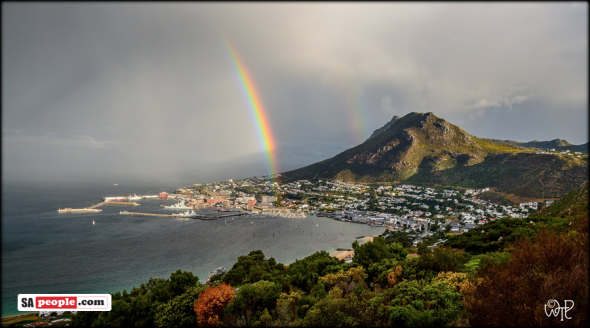
South Africa: The Death of the Rainbow Nation…
by Magnus Heysteck If anyone reading this column still had any lingering hopes that South Africa is not hurtling towards being a failed state, then I’m sure these hopes were finally dashed by what happened in Parliament on the evening of November 13 2014. When the president of a country, according to some reports, starts sending […]

by Magnus Heysteck
If anyone reading this column still had any lingering hopes that South Africa is not hurtling towards being a failed state, then I’m sure these hopes were finally dashed by what happened in Parliament on the evening of November 13 2014.

When the president of a country, according to some reports, starts sending in his jackbooted thugs into the most hallowed halls of democracy in order to silence dissenting voices, then you need to realise that the end is near for what is described as a constitutional democracy.

These are the kind of images you would expect from a tin-pot dictator in the middle of an African jungle, where some buffoon has proclaimed himself Leader for Life, wearing a full military uniform with rows and rows of gleaming medals, all awarded to himself by himself.
Not in a country where most concerned middle-class citizens were hoping against hope that South Africa would escape the now familiar cascading collapse of the economy, infrastructure and political tolerance in most post-colonial African countries. But it is happening, right before our eyes and we can see just how powerless we are.
Uhuru (Swahili: freedom) in Africa, the cynics often said, lasts for about twenty years before everything starts collapsing: the infra-structure, the economy, the collection of taxes. Does that look familiar to you?
Let there be no doubt: what happened on Thursday evening will have serious consequences, much as the nail-painting ANC-cohorts would like to laugh and jeer. The world is watching and from what I can gather they were alarmed by what was transpiring.
Within minutes of the unfolding events on Thursday evening, my inbox started beeping. Messages and questions started pouring in: from a brother in the Bahamas, a friend in Australia, foreign clients with money still locked up in this country. All the questions were the same: what the hell is happening in South Africa?
And what can you say? “Everything is fine, Boet. When are you coming home?”
Such a suggestion will be met with scornful laughter:” Not in a million years,” would most probably be the reply.
Power-mad liberation movement
In one dramatic and shocking evening the ruling ANC party was unveiled for what it really is: a power-mad liberation movement prepared to follow a scorched-earth policy in order to achieve its political objectives.
The world is watching and the world is worried.
Every time one of the international credit ratings agencies such as Fitch, Standard and Poor’s and Moody’s downrate our country, as happened two weeks ago, it is laughed off by local politicians as not being important.
We will see how important it is when we get downrated to junk-bond status and our bond, property and currency markets suffer in the fall-out.
The ANC has only one political objective and that is to remain in power.
It will use every mechanism available to it. It will use legislation that was drawn up by the Nationalist Party in 1961 in order to control the flow of money, namely foreign exchange control.
It will use the legal system for as long as it can at the expense of the taxpayer. It will use the tax system to spy on taxpayers. And it’s bound to get worse.
Where is our so-called “best constitution in the world”, as it is so often described?
When they come for you and your possessions the constitution will be of little comfort.
If you doubt me or think I’m talking through my hat my dear friends, then I suggest you spend some time reading the book “BEE: Helping or Hurting” by Dr Anthea Jeffery (Tafelberg), one of the country’s most respected political analysts, published only weeks ago.
Like a proverbial sleuth has Dr Jeffery attempted to link the various, at first glance, unrelated and seemingly innocuous pieces of legislation already before Parliament or in the process of being drawn up. They deal with BEE, Affirmative Action and the right of the State to take possession of property if it deems it to be in the national interest.
“Behind the schemes, however, the ANC had other objectives in mind. In particular, it had long been committed to a national democratic revolution (NDR) aimed at eliminating property relations and ensuring demographic representivity in every sphere of society. In addition, its allies in Cosatu and the SA Communist Party—joint rulers with the ANC in the governing tripartite alliance—had long identified the NDR as providing the shortest and most direct to a socialist and then a communist society,” she writes.
Since coming to power the ANC has never deviated from its belief in the NDR, with the most recent reaffirmation coming at its national conference at Manguang in the Free State in 2012.
Read the book, all 500 pages, over the coming Christmas break and then tell me you are not worried.
Property rights under threat
And ‘property’ in this context, does not merely refer to your personal residential property, it refers to property in the broadest possible sense of the word, i.e. all your earthly possessions, be it a farm, business, factory, restaurant, café and even intellectual property rights which you might own. All mineral rights in SA were confiscated by the State in this manner some ten years or so ago.
My advice for some time has been to repatriate as much as your personal assets out of the country as you can.
This followed on, in particular, after my altercation with SA Reserve Bank, when I saw first-hand the enormous power this institution has over the individual and how it can be abused [by] individuals within the system.
Where is our wonderful constitution when the SA Reserve Bank can make rules and regulations in secrecy, attach your personal property at whim and then act as judge and executioner should you wish to dispute the rulings?
I took a vow at the time in 2010 that I will never allow myself to be in such a position again and I repatriated all my disposal assets at the time out of the reach of the local banking system and out of reach of the clutches of the SA Reserve Bank. This has, ironically turned out to be an outstanding investment as I bought US dollars at R6,7 and invested most of it in biotech and technology funds offshore where the returns have been in excess of 200% so far.
And with the way the rand and economy is performing I’m sure that these returns will get even better over time. My view is that the rand will be R20 in four year’s time. More on that in the next column.
Asset swaps not as safe as you think
And don’t for a moment think that your rand-hedge investments will protect you when the collapse in the rand really gets going. Few investors realise (and the fund management companies will try and keep this very quiet) that assets swaps exists at the mercy of SA’s exchange control regulations. If SARB – under direction from the government – orders all these asset management companies to unwind these asset swaps you will end up with local investments again, most probably at a time when your need for offshore investments is the greatest.
And don’t think it can’t happen. It can and most probably will happen in the next five years as the cumulative effect of weakening growth, weakening foreign exchange and a rise in direct offshore investing starts to manifest itself.
Government will one day, is my forecast, simply send in its jackbooted bankers from SARB to switch off the offshore investing tap. It will happen overnight, without warning and at precisely the time when the demand for foreign assets is at its peak.
It reminds me of the old joke that used to circulate in the offices of The Star in the mid 1990’s when I was employed there: there are only two types of ex-Rhodesians in the world. Those who took all their money out of the country and those who wished that they did.
This article is republished with kind permission of Magnus Heystek. Please view the original article on MoneyWeb here.
- View a response to this article, and more positive outlook to Thursday’s events, by Ryk van Niekerk here.